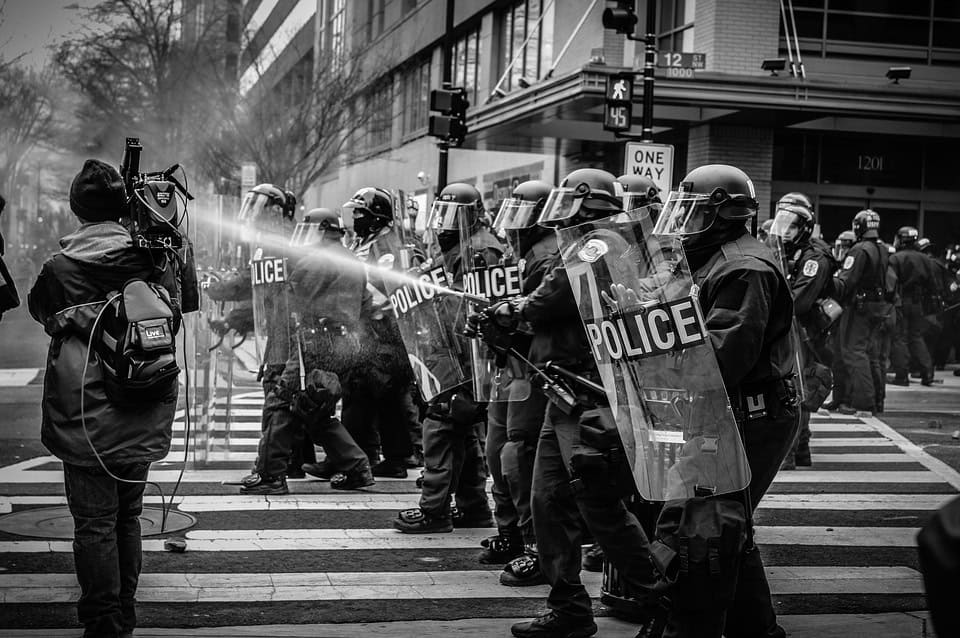State legislation would allow civilian-complaint boards to have subpoena power, investigatory powers
Following the death of Tyre Nichols at the hands of five Memphis police officers in Tennessee, a recurring question remains: “What will it take to stop police brutality?”
That is what members of the Coalition For Peace Action, Not in Our Town Princeton, and the People’s Organization for Progress came together to discuss during an online webinar on Feb. 7.
“The greatest antidote to police brutality is organized and mobilized people,” said Lawrence Hamm, president of the People’s Organization for Progress based in Newark. He was the keynote speaker of the webinar.
“When people go to sleep and become complacent, when people fail to speak out and take action against injustice, that just creates an atmosphere where that injustice can thrive.”
Hamm added that there must be a movement against police brutality.
“People [ask] ‘What will it take to stop police brutality?’ Well, it will take everything we got to stop it,” he said.
Memphis officials released video footage of the Jan. 7 incident, taken from police officers’ body-worn cameras and surveillance cameras on Jan. 27. Five police officers allegedly converged on Nichols and beat him. He had been stopped by police for what they alleged was reckless driving, according to published reports.
Nichols was hospitalized and died three days later, according to reports. The five police officers were fired from the Memphis Police Department on Jan. 20. They were charged with second-degree murder and other offenses.
The former Memphis police officers pleaded not guilty to the charges on Feb. 17 at an indictment hearing at the Shelby County Criminal Justice Center in Memphis.
Hamm noted the importance of voting “for people who openly state that they are for police reform, they support police review boards, and they support the abolition of qualified immunity.”
“We need to write letters to our elected officials, make phone calls and go down and lobby,” Hamm said, adding they must keep the pressure on with protests. “In fact, we have to exert greater pressure, because it is clear that pressure that is being exerted now is not enough.”
Hamm wanted to make it clear. He is not trying to make the case against all police officers, just the behavior of some.
“The type of brutality that was visited upon Tyre Nichols in Memphis, the type of brutality visited upon George Floyd, the kind of brutality visited upon Carl Dorsey in Newark, it will not end until the police understand that there will be consequences for that behavior,” he said.
Another way to address police brutality in New Jersey is the creation of civilian-complaint review boards with subpoena power, according to Hamm.
“I do think this will send a strong signal to police that they need to change their behavior,” he said.
Civilian-complaint review boards are made up of residents – not police officers – who investigate allegations of police misconduct raised by other residents. The boards already exist in New Jersey, but they do not have subpoena power.
In a 2020 New Jersey Supreme Court ruling on Newark’s 2016 ordinance creating a civilian-complaint review board, the state’s highest court ruled that the board could not be granted subpoena power and the board could not conduct investigations at the same time the police department’s Internal Affairs office is performing its own investigation.
Legislative action can only grant subpoena powers to the civilian-complaint review boards, according to the ruling.
“I am under no illusions that if we get police review boards with subpoena power that will automatically stop police brutality,” Hamm admitted. “I support [civilian-complaint review boards] because there should be civilian oversight or community control over the police.”
There are two bills currently in the state legislature Assembly Bill A1515 and a similar bill in the Senate [S2295] that would grant civilian review board subpoena and investigatory powers.
The Assembly A1515 Bill was introduced in January 2022 and referred to the Assembly Community Development and Affairs Committee, while the Senate’s S2295 bill had been introduced in March 2022 and referred to Senate Law and Public Safety Committee.
Hamm not only urged the release and passage of those bills, but also the creation of a civilian-complaint review board in Princeton, which has seen a significant push led by the Princeton Civil Rights Commission and Lewis Maltby, civil rights lawyer and member of the Civil Rights Commission.
Maltby said he has been leading the effort with the Civil Rights Commission for two years to get some type of action taken to improve the quality of policing in Princeton.
“We don’t have George Floyds’ here. It is not that bad, but it is not Camelot,” he said. “This webinar is important, the demonstrations are important, but before the municipality is going to move, they need to believe that the people in the community care.”
In 2020, the New Jersey Attorney General revised the statewide “use of force policy” and included revisions prohibiting all forms of deadly force against a civilian, such as chokeholds except as an absolute last resort.
Hamm believes those revisions “have not had much of an impact.”
“It is a widespread issue in New Jersey and in the nation” he said. “Millions of dollars in settlements are made every year by cities and towns that lose in court.”

